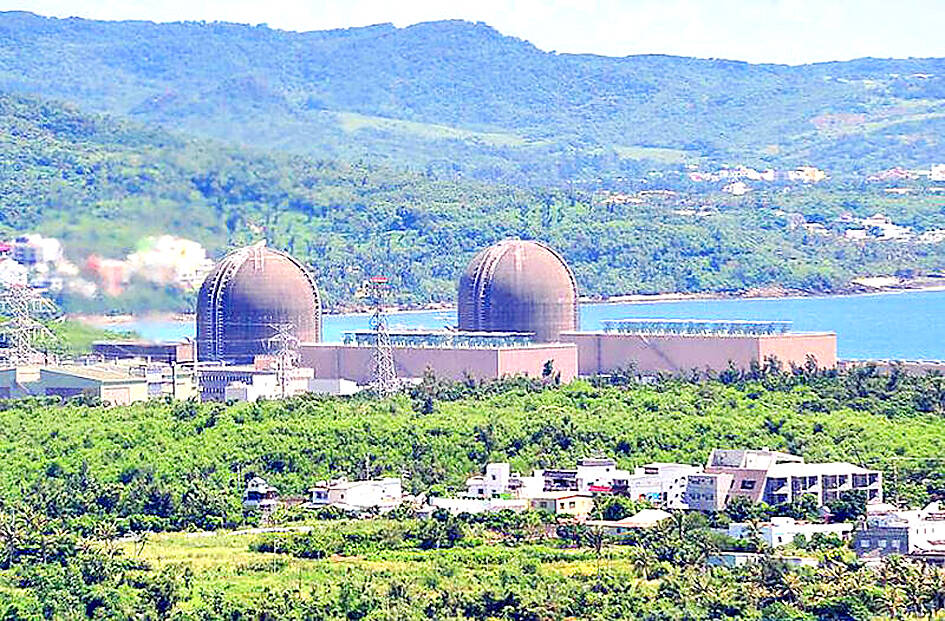Chinese Nationalist Party (KMT) lawmakers have proposed five amendments that would remove the “nuclear-free homeland” goal in favor of other terminology emphasizing carbon neutrality.
The opposition lawmakers have proposed several changes to Article 23 of the Basic Environment Act (環境基本法), which mandates the government to “formulate a plan to progressively achieve the goal of a non-nuclear homeland.”
The bills offer slightly different wording options, such as calling for a “zero-carbon homeland” or “utilizing nuclear energy to decarbonize.”

Photo: Tsai Tsung-hsien, Taipei Times
In KMT Legislator Weng Hsiao-ling’s (翁曉玲) version, the act would require the government to “formulate a plan to progressively achieve the goal of net zero emissions.”
Another version supported by KMT legislators Lai Shyh-bao (賴士葆) and Chang Chih-lun (張智倫) says the government “should reduce and manage greenhouse gas emissions in response to climate change, and progressively achieve the goal of a zero-carbon homeland.”
KMT Legislator Su Ching-chuan (蘇清泉) proposed mandating the use of nuclear power as an element of the government’s energy policy.
Su’s amendment would also add a provision to Article 28 offering health exams and compensation to people harmed by environmental pollutants.
Achieving net zero emissions by 2050 is the global consensus, and nuclear energy should be developed to achieve that goal if it can be done safely, KMT lawmakers said.
Some countries have classified nuclear power as a form of clean energy, while the International Energy Agency has said it would be difficult to build a sustainable and clean energy system without nuclear power, they said.
The environment act is only one of a number of laws the KMT has set its sights on since passing controversial bills to expand legislative powers last month.
The party is also looking to mandate construction of three large transportation infrastructure projects serving the east coast, as well as exempt party-affiliated organizations from investigations for ill-gotten assets.
On Friday last week, Premier Cho Jung-tai (卓榮泰) told lawmakers that his Cabinet “has no plans” to amend regulations that would have paved the way for the continued operation of Taiwan’s only operational nuclear power plant.
That meant there would be no legal basis for the continued operation of the Ma-anshan Nuclear Power Plant in Pingtung County.
Ma-anshan is the only operating nuclear power plant in Taiwan, but it would be decommissioned after the operating licenses of its two reactors expire next month and in May next year.
Energy Administration data show that nuclear power represented 6.3 percent of Taiwan’s energy mix last year, while fossil fuels accounted for 83.1 percent and renewables for 9.5 percent.
Additional reporting by CNA

The inspection equipment and data transmission system for new robotic dogs that Taipei is planning to use for sidewalk patrols were developed by a Taiwanese company, the city’s New Construction Office said today, dismissing concerns that the China-made robots could pose a security risk. The city is bringing in smart robotic dogs to help with sidewalk inspections, Taipei Deputy Mayor Lee Ssu-chuan (李四川) said on Facebook. Equipped with a panoramic surveillance system, the robots would be able to automatically flag problems and easily navigate narrow sidewalks, making inspections faster and more accurate, Lee said. By collecting more accurate data, they would help Taipei

TAKING STOCK: The USMC is rebuilding a once-abandoned airfield in Palau to support large-scale ground operations as China’s missile range grows, Naval News reported The US Marine Corps (USMC) is considering new sites for stockpiling equipment in the West Pacific to harden military supply chains and enhance mobility across the Indo-Pacific region, US-based Naval News reported on Saturday. The proposed sites in Palau — one of Taiwan’s diplomatic allies — and Australia would enable a “rapid standup of stored equipment within a year” of the program’s approval, the report said, citing documents published by the USMC last month. In Palau, the service is rebuilding a formerly abandoned World War II-era airfield and establishing ancillary structures to support large-scale ground operations “as China’s missile range and magazine

A 72-year-old man in Kaohsiung was sentenced to 40 days in jail after he was found having sex with a 67-year-old woman under a slide in a public park on Sunday afternoon. At 3pm on Sunday, a mother surnamed Liang (梁) was with her child at a neighborhood park when they found the man, surnamed Tsai (蔡), and woman, surnamed Huang (黃), underneath the slide. Liang took her child away from the scene, took photographs of the two and called the police, who arrived and arrested the couple. During questioning, Tsai told police that he had met Huang that day and offered to

A British man was arrested for attempting to smuggle 14.37kg of marijuana into Taiwan through Taiwan Taoyuan International Airport, Taipei Customs said late yesterday. The man, who arrived from Bangkok at 9pm on Friday, was asked by customs officers to open his luggage during a random inspection, Taipei Customs said in a news release. The passenger, whose identity was not disclosed, refused to open his suitcase and tried to flee the restricted area. He was eventually subdued by three customs officials and an Aviation Police Bureau officer. A later search of his checked luggage uncovered 14.37kg of marijuana buds. The case was handed over